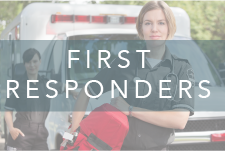Building Personal Awareness
- Sep 9, 2021
- 6 min read
Updated: Oct 21, 2025

You've landed in the right place to understand how building routines can profoundly impact the lives of first responders. This content dives into how a structured daily schedule is more than just a list of tasks, it's a powerful tool for building personal awareness and managing the effects of stress and trauma.
How can a routine help first responders manage stress and trauma?
A consistent routine helps first responders build mindfulness and awareness of their emotional state. By establishing a predictable schedule, they can more easily recognize subtle deviations in their feelings or behaviors, which can be early indicators of stress or trauma affecting them.
This content offers a deeper dive into the relationship between routines and a first responder's mental well-being, exploring how to create an effective routine and use it to better understand your personal needs. Keep reading to learn how to turn your daily schedule into a resource for self-care and resilience.
Creating a Routine for First Responders
First responders continue to embody the spirit of their occupations by carrying a sense of justice, protection, and strength throughout all parts of the day. If a first responder is navigating a high-stress situation or at home, the effects of stress, trauma, or anxiety can continue to affect them.
Building personal awareness and routines improve first responders' mindfulness and awareness of their own emotional state. Some may see these emotions as something to hide or sidestep. However, building awareness of their presence can provide insights that help first responders begin to create a healthy mindset and daily routine. Keeping a rigid routine can be a major resource for first responders.
This allows them to use their tightly curated schedule to practice mindfulness and awareness of their own emotional state each day. This can ultimately lead to a better understanding of one’s personal needs and how trauma, anxiety, or stress can affect their professional performance on duty.
Recognizing the Effects of Trauma and Stress on Daily Life
Building awareness about the effects stress and anxiety have on the daily life of first responders is paramount for employing other pertinent healthy practices. First responders are exposed to a myriad of traumatic experiences due to their unique line of work. Each of these experiences can produce a great deal of stress.
Natural disasters, civil disputes, and treating traumatic injuries are all experiences that can stick in a person’s mind long after the event has concluded. Each first responder’s unique experiences can affect their daily lives.
Stress leading to inconsistent sleep patterns or nightmares can be very common. For some, these nightmares may only seem tangentially related to their experience. They may not make the connection between their sleep issues and stress overtly apparent. However, exhaustion and stress can cause a number of horrific images in one’s mind that can lead to persistent nightmares, insomnia, and invasive thoughts.
The breakdown of trust or feeling one’s tolerance for frustration or annoyance dwindling can also be the result of stress or trauma. Additionally, having difficulty focusing can make it hard to maintain effective communication and often affects decision-making skills.
Combined, this can all create a pessimistic worldview. The effects of PTSD and panic can be significant for first responders. Even lingering stress, anxiety, and trauma can drastically affect one’s mental health.

Building Personal Awareness: Constructing an Effective Routine
Routines are a powerful tool for one’s mental health. Not only can their construction add a sense of consistency to one’s life, but the rigid schedule they produce can be used as a tool to be more aware of one’s mental and emotional health. Creating an effective routine can inform how an individual begins their day. Doing so can also keep a person in-tune with their own bodies and emotions.
Effective routines start from the moment one wakes up, with consistent alarms helping to regiment an effective sleep schedule. Keeping one’s morning routine consistent can feel mundane, but also extraordinarily supportive.
Scheduling a time for morning coffee and breakfast, 20 minutes to rest and watch the morning news, two minutes to brush one’s teeth, and finally getting dressed and collecting the tools for the day’s work are all routines. These can be paramount for identifying stress, anxiety, or the effects of trauma that may otherwise go overlooked.
Using a Routine as a Tool for Mindfulness and Awareness
Establishing a routine and having a predictable start to the day can then help an individual incorporate mindfulness practices in their daily lives. For example, an individual may brush their teeth and focus on the feel of the brush in their mouth, the cold of the tile on their feet, or the timing of one’s heartbeat. These can all be ways for an individual to ground themselves in their own bodies early in the day.
Feeling the warmth of the cup of coffee in one’s hands can continue to reinforce these practices all throughout the morning. This ensures that one is constantly mindful of their own body before facing the stresses of the day.
However, it is the deviation from these routines that can be very telling. Setting up these unwavering routines allows an individual to recognize when they are not moving at the same pace in the morning, or if they are feeling different one day. Noticing that some days are more difficult to wake up to one’s alarm, or that one is moving more sluggishly can become an exercise in awareness.
Taking note of these days and writing down one’s feelings and symptoms allows an individual to explore the effects of stress, anxiety, or trauma in their lives. Having a morning routine disrupted by one’s own emotional state can be the first indication that self-care practices are needed. The more consistently these things occur, the more aware an individual will be to look out for developing symptoms and seeking professional help before self-destructive coping strategies occur.
Frequently Asked Questions:
• What are some common effects of stress and trauma on a first responder’s daily life?
Stress can lead to inconsistent sleep patterns, nightmares, difficulty focusing, and a general pessimistic worldview. It can also cause a breakdown of trust and a dwindling tolerance for frustration.
• Why is building personal awareness important for first responders?
Building personal awareness helps first responders recognize the effects of stress, anxiety, or trauma on their bodies and minds. This insight allows them to begin creating a healthy mindset and a daily routine to support their well-being.
• How can a routine be used as a tool for mindfulness?
A routine can be used for mindfulness by focusing on sensory details during daily tasks, like feeling the warmth of a coffee cup or the cold of the floor tiles while brushing your teeth. This helps a person ground themselves and stay in tune with their body.
• What should a first responder do if they notice a deviation in their routine?
Noticing a deviation from a consistent routine is a key indicator of a change in one’s emotional state. Taking note of these changes and writing down one's feelings can help them explore the effects of stress and determine if self-care practices or professional help are needed.
• Why are routines so beneficial for a first responder’s mental health?
Routines provide consistency and a predictable structure in life. This rigid schedule can be used as a tool to become more aware of one’s mental and emotional health, helping to identify stress, anxiety, or the effects of trauma that might otherwise be overlooked.
After reading about the power of routines and self-awareness in managing stress and trauma, we want you to know that you are not alone on this journey. At Chateau Health and Wellness Treatment Center, we understand the unique challenges faced by first responders, and we are committed to providing the support you need to navigate them. Our team is here to help you build resilience, foster a healthy mindset, and develop effective coping strategies. If you or a loved one is struggling, we encourage you to take the next step with us. Contact us today at (435) 222-5225 to start a conversation about how we can support your well-being. We are here to partner with you on your path to healing and recovery.

About The Author
Ben Pearson, LCSW - Clinical Director
With 19 years of experience, Ben Pearson specializes in adolescent and family therapy, de-escalation, and high-risk interventions. As a former Clinical Director of an intensive outpatient program, he played a key role in clinical interventions and group therapy. With 15+ years in wilderness treatment and over a decade as a clinician, Ben has helped countless individuals and families navigate mental health and recovery challenges.
Danny Warner, CEO of Chateau Health and Wellness
Brings a wealth of experience in business operations, strategic alliances, and turnaround management, with prior leadership roles at Mediconnect Global, Klever Marketing, and WO Investing, Inc. A graduate of Brigham Young University in Economics and History, Danny has a proven track record of delivering results across diverse industries. His most transformative role, however, was as a trail walker and counselor for troubled teens at the Anasazi Foundation, where he directly impacted young lives, a personal commitment to transformation that now drives his leadership at Chateau.
Austin Pederson, Executive Director of Chateau Health and Wellness
Brings over eight years of experience revolutionizing mental health and substance abuse treatment through compassionate care and innovative business strategies. Inspired by his own recovery journey, Austin has developed impactful programs tailored to individuals facing trauma and stress while fostering comprehensive support systems that prioritize holistic wellness. His empathetic leadership extends to educating and assisting families, ensuring lasting recovery for clients and their loved ones.









